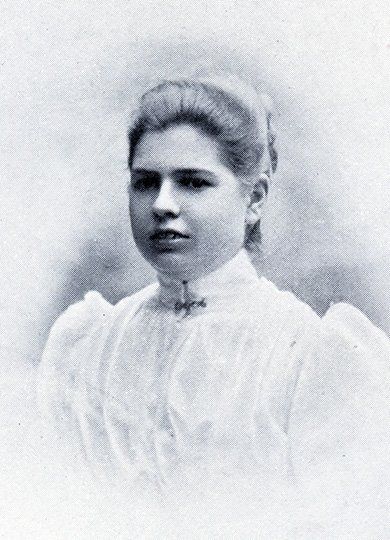© This article is an extract from Paul Hattaway's epic 656-page China’s Book of Martyrs, which profiles more than 1,000 Christian martyrs in China since AD 845, accompanied by over 500 photos. You can order this or many other China books and e-books here.
1895 - Elsie Marshall
August 1, 1895
Gutian, Fujian

Elsie Marshall.
Of the 11 missionaries and children who were killed at Gutian in 1895, perhaps none was remembered so fondly as the young English rose Elsie Marshall. Her young life of just 24 years had touched so many that a biography called For His Sake was written soon after her martyrdom.[1]
Elsie Marshall was born on November 9, 1869, at Birchfield near the English town of Birmingham. Her father, the Rev. J. W. Marshall, was the vicar of St. John’s at Blackheath. Her name, Elsie, means ‘consecrated to God.’ Those who knew her agree that no more apt description could be given. Her family later said,
“Of all who knew [Elsie], brightness and sunshine were always associated with her; and that this was the brightness of God’s countenance, and the sunshine of His love, reflected in her life, those who watched her growth from her infancy never doubted. She used to say, ‘I do love people who seem to have a liberty in Christ’s religion, always loving to sing, and to speak of Him.’”[2]
From a young age Elsie taught the Sunday school class at her church. She read every missionary book she could lay hold of, and it was through this influence that she longed to become a missionary to India. The direction of her call changed in November 1891, when Robert and Louisa Stewart spoke at her father’s parish. When they shared the need for female missionaries to come and help reach the desolate women of China, Elsie’s heart stirred within her, and soon after she offered her life to serve in China with the Church of England Zenana Missionary Society. Little did she know that less than four years later she would be slaughtered for Christ alongside the Stewarts.
Elsie Marshall sailed for China on the steamship Arcadia on October 14, 1892, still a few weeks shy of her 23rd birthday. A number of other missionary recruits were on the same voyage. One of the senior members of the group later wrote,
“We travelled out together, and very sweet are my memories of Elsie during that six weeks’ voyage: her earnest and whole-souled devotion to God, and her yearning tender love for souls. She had left her home to be God’s messenger to all men, not alone to be His missionary to the Chinese. How she longed for and prayed for the souls of the sailors; and how brave she was in speaking to the men!”[3]
After spending her first year learning the Chinese language, Elsie moved inland to the town where she would spend the remainder of her short life. Culture shock and homesickness began to challenge Elsie. In April 1895 she wrote to a friend,
“Sometimes I have rather bad times. I believe it is the devil. He makes me conjure up all sorts of dreadful things happening to the Christians…and I feel as if I could never face them again. Those are rather hard times of struggle, the hardest I have ever had in my life… but once I get back to the one thought, ‘It is the will of Jesus,’ and I have no choice in it, then it is all right again.”[4]
As the summer of 1895 commenced, Elsie was so involved in the work that she asked her leader, Robert Stewart, if she could delay coming to the Huasang retreat centre until August. Stewart, with her well-being in mind, declined her request and told her to come with the other missionaries in July. The massacre took place on August 1st. The last letter Elsie Marshall wrote home before she was martyred could not be more appropriate for this young handmaiden of the Lord. Mentioning the upcoming spiritual retreat, she wrote,
“I know He has some very precious lessons to teach us. One thing, I think, is to look on and see how God works. Another thing, not to be too much engrossed in the work itself to forget the Master, but to remember if He likes to call us away to other work He is at liberty to do so. We are His bond-slaves, just to go here and there as He pleases, and He has made me so glad to leave it all with Him now, and there’s not a shade of worry.”[5]
Elsie was barely awake when screams rang out around the retreat centre that fateful morning. She was one of the four women hacked to pieces after they were dragged from the house. Elsie was seen “clinging to her Bible to the very end, though the hand with which she grasped it was nearly severed.”[6] Finally she fell under the savage blows raining down on her, and she went to be with Jesus.
When news reached England that Elsie had been killed, her grieving father J. W. Marshall courageously preached to his congregation on the verse, “This…will not end in death. No, it is for God’s glory, so that God’s Son may be glorified through it.”[7] On her coffin the following words were inscribed to honour the young martyr: “Miss Elsie Marshall, whose young bright life sparkled with devotion to God and His work,—‘She asked life of Thee, and Thou gavest it, even life for ever and ever.’”
1. See The Religious Tract Society, For His Sake.
2. The Religious Tract Society, For His Sake, 4.
3. The Religious Tract Society, For His Sake, 7.
4. The Religious Tract Society, For His Sake, 185.
5. The Religious Tract Society, For His Sake, 207-208.
6. Barnes, Behind the Great Wall, 143.
7. John 11:4.





